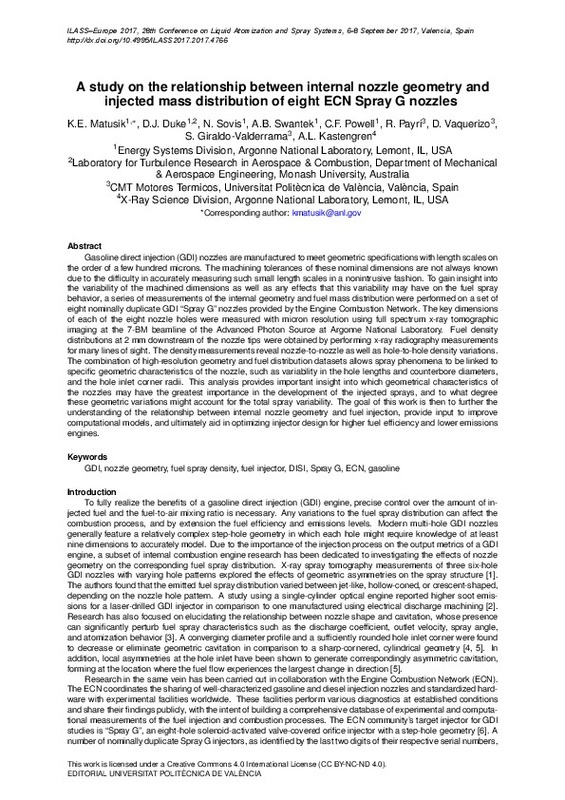JavaScript is disabled for your browser. Some features of this site may not work without it.
Buscar en RiuNet
Listar
Mi cuenta
Estadísticas
Ayuda RiuNet
Admin. UPV
A study on the relationship between internal nozzle geometry and injected mass distribution of eight ECN Spray G nozzles
Mostrar el registro sencillo del ítem
Ficheros en el ítem
| dc.contributor.author | Matusik, Katarzyna
|
es_ES |
| dc.contributor.author | Duke, Daniel
|
es_ES |
| dc.contributor.author | Sovis, Nicholas
|
es_ES |
| dc.contributor.author | Swantek, Andrew
|
es_ES |
| dc.contributor.author | Powell, Christopher
|
es_ES |
| dc.contributor.author | Payri, Raul
|
es_ES |
| dc.contributor.author | Vaquerizo, Daniel
|
es_ES |
| dc.contributor.author | Giraldo Valderrama, Jhoan Sebastián
|
es_ES |
| dc.contributor.author | Kastengren, Alan
|
es_ES |
| dc.date.accessioned | 2018-05-09T08:55:40Z | |
| dc.date.available | 2018-05-09T08:55:40Z | |
| dc.date.issued | 2017-07-28 | |
| dc.identifier.isbn | 9788490485804 | |
| dc.identifier.uri | http://hdl.handle.net/10251/101587 | |
| dc.description.abstract | [EN] Gasoline direct injection (GDI) nozzles are manufactured to meet geometric specifications with length scales on the order of a few hundred microns. The machining tolerances of these nominal dimensions are not always known due to the difficulty in accurately measuring such small length scales in a nonintrusive fashion. To gain insight into the variability of the machined dimensions as well as any effects that this variability may have on the fuel spray behavior, a series of measurements of the internal geometry and fuel mass distribution were performed on a set of eight nominally duplicate GDI “Spray G” nozzles provided by the Engine Combustion Network. The key dimensions of each of the eight nozzle holes were measured with micron resolution using full spectrum x-ray tomographic imaging at the 7-BM beamline of the Advanced Photon Source at Argonne National Laboratory. Fuel density distributions at 2 mm downstream of the nozzle tips were obtained by performing x-ray radiography measurements for many lines of sight. The density measurements reveal nozzle-to-nozzle as well as hole-to-hole density variations. The combination of high-resolution geometry and fuel distribution datasets allows spray phenomena to be linked to specific geometric characteristics of the nozzle, such as variability in the hole lengths and counterbore diameters, and the hole inlet corner radii. This analysis provides important insight into which geometrical characteristics of the nozzles may have the greatest importance in the development of the injected sprays, and to what degree these geometric variations might account for the total spray variability. The goal of this work is then to further the understanding of the relationship between internal nozzle geometry and fuel injection, provide input to improve computational models, and ultimately aid in optimizing injector design for higher fuel efficiency and lower emissions engines. | es_ES |
| dc.description.sponsorship | This research was performed at the 7-BM beamline of the APS at Argonne National Laboratory. Use of the APS is supported by the U.S. Department of Energy (DOE) under Contract No. DE-AC02-06CH11357. We gratefully acknowledge the computing resources provided on Blues, a high-performance computing cluster operated by the Laboratory Computing Resource Center at Argonne National Laboratory. We thank Dr. Doga Gürsoy for the use of TomoPy and corresponding user support, as well as Dr. Xianghui Xiao at the APS 2-BM beamline for technical guidance in performing x-ray tomography. Argonne’s x-ray fuel injection research is sponsored by the DOE Vehicle Technologies Program under the direction of Gurpreet Singh and Leo Breton. | es_ES |
| dc.format.extent | 8 | es_ES |
| dc.language | Inglés | es_ES |
| dc.publisher | Editorial Universitat Politècnica de València | es_ES |
| dc.relation.ispartof | Ilass Europe. 28th european conference on Liquid Atomization and Spray Systems | es_ES |
| dc.rights | Reconocimiento - No comercial - Sin obra derivada (by-nc-nd) | es_ES |
| dc.subject | GDI | es_ES |
| dc.subject | Nozzle geometry | es_ES |
| dc.subject | Fuel spray density | es_ES |
| dc.subject | Fuel injector | es_ES |
| dc.subject | DISI | es_ES |
| dc.subject | Spray G | es_ES |
| dc.subject | ECN | es_ES |
| dc.subject | Gasoline | es_ES |
| dc.title | A study on the relationship between internal nozzle geometry and injected mass distribution of eight ECN Spray G nozzles | es_ES |
| dc.type | Capítulo de libro | es_ES |
| dc.type | Comunicación en congreso | es_ES |
| dc.identifier.doi | 10.4995/ILASS2017.2017.4766 | |
| dc.relation.projectID | info:eu-repo/grantAgreement/DOE//DE-AC02-06CH11357/ | es_ES |
| dc.rights.accessRights | Abierto | es_ES |
| dc.contributor.affiliation | Universitat Politècnica de València. Escuela Técnica Superior de Ingenieros Industriales - Escola Tècnica Superior d'Enginyers Industrials | es_ES |
| dc.contributor.affiliation | Universitat Politècnica de València. Instituto Universitario CMT-Motores Térmicos - Institut Universitari CMT-Motors Tèrmics | es_ES |
| dc.contributor.affiliation | Universitat Politècnica de València. Departamento de Máquinas y Motores Térmicos - Departament de Màquines i Motors Tèrmics | es_ES |
| dc.description.bibliographicCitation | Matusik, K.; Duke, D.; Sovis, N.; Swantek, A.; Powell, C.; Payri, R.; Vaquerizo, D.... (2017). A study on the relationship between internal nozzle geometry and injected mass distribution of eight ECN Spray G nozzles. En Ilass Europe. 28th european conference on Liquid Atomization and Spray Systems. Editorial Universitat Politècnica de València. 313-320. https://doi.org/10.4995/ILASS2017.2017.4766 | es_ES |
| dc.description.accrualMethod | OCS | es_ES |
| dc.relation.conferencename | ILASS2017 - 28th European Conference on Liquid Atomization and Spray Systems | es_ES |
| dc.relation.conferencedate | September 06-08,2017 | es_ES |
| dc.relation.conferenceplace | Valencia, Spain | es_ES |
| dc.relation.publisherversion | http://ocs.editorial.upv.es/index.php/ILASS/ILASS2017/paper/view/4766 | es_ES |
| dc.description.upvformatpinicio | 313 | es_ES |
| dc.description.upvformatpfin | 320 | es_ES |
| dc.type.version | info:eu-repo/semantics/publishedVersion | es_ES |
| dc.relation.pasarela | OCS\4766 | es_ES |
| dc.contributor.funder | U.S. Department of Energy | es_ES |








